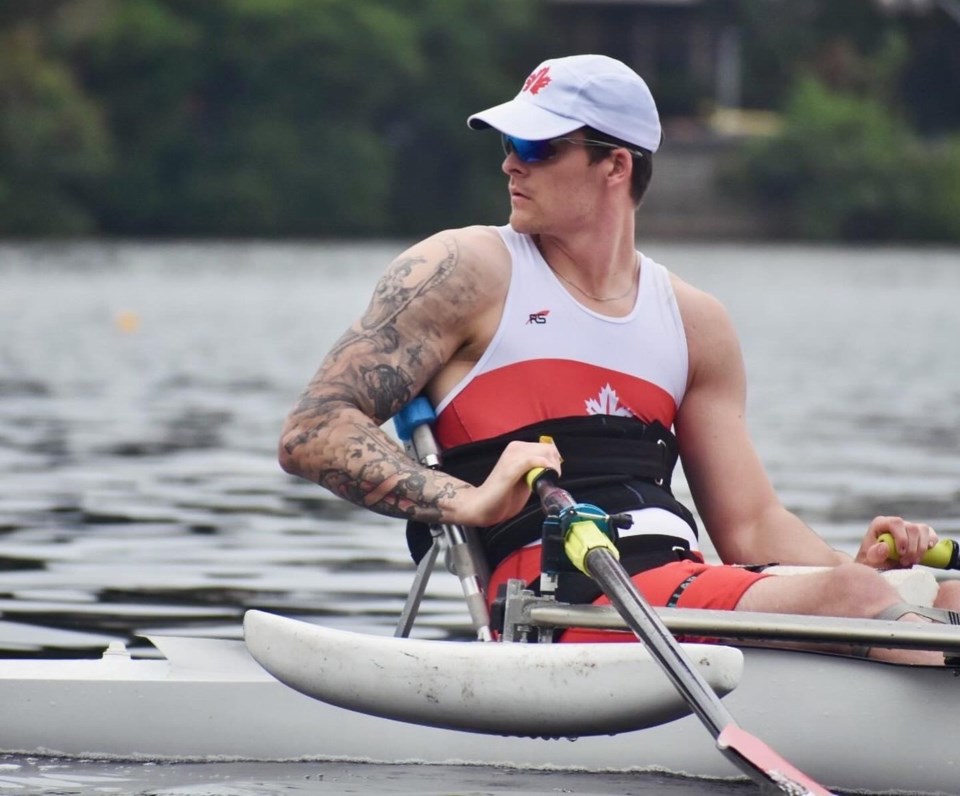Jacob Wassermann says the transition from tending goal in hockey to rowing wasn't as difficult as people might think.
Wassermann, a survivor of a bus crash that killed 16 members of the Humboldt Broncos junior hockey team in 2018, was named to Canada's Paralympic team Thursday in the sport of para rowing.
"One of the things I loved the most about С����Ƶ a hockey player was the people and С����Ƶ a part of a team," Wassermann said during a virtual media conference call Thursday.
"The transition to rowing has felt more natural than what some people might think it would be going from a team sport to an individual sport. Goalies are a little bit on their own and doing their own thing out there, so it seemed fairly straightforward to me."
The 24-year-old will be among approximately 140 Canadians competing in the Paralympic Games in Paris from Aug. 28 to Sept. 8.
Wassermann was among 13 people who survived the crash near Tisdale, Sask., on April 6, 2018.
He was paralyzed from the navel down when a semi-trailer truck drove through a stop sign and collided with the Broncos' team bus en route to a Saskatchewan Junior Hockey League playoff game.
Wassermann had been named co-winner of the SJHL's rookie-of-the-year award just over a month before the crash.
He tried adaptive water-skiing and para hockey before a friend he met while grocery shopping suggested he check out the Saskatoon Rowing Club.
Wassermann took to rowing so rapidly that, less than two years after getting into a shell, he will make his Paralympic debut in his first full season of international racing.
"My wife put it one way . . . I've been an athlete my whole life," Wassermann said. "I joined rowing two years ago, but I have been training for 24 years. All that work I've done my whole life, whether it was a hockey player before, or since the crash all the other sports I've done and all the training I've done, it's all gone into this sport.
"Once I started, I just had to learn the techniques. I've got the build for it, I guess, I'm tall and lanky, which always goes well with rowing. I fell into the right sport for me."
He claimed a national title in 2023 in the men's PR1 single category for spinal cord injuries. In that classification, athletes row with their arms and shoulders only. Strapping around their midsections provide support and stability in the boat.
Wassermann's silver medal at a continental regatta in Rio de Janeiro in March qualified a Canadian boat for Paris. He was the lead candidate to fill it, and Rowing Canada confirmed it Thursday.
"If the crash taught me anything is that, just to go with it, right? Life will sometimes throw you a curveball and what I've really learned is to just keep moving forward and keep pursuing the dreams that I had," Wassermann said.
"I wanted to be a professional athlete when I was two years old and the crash happened. Hockey wasn't the way I was going to go with it anymore. I just kept moving forward and training hard and eventually I fell into the sport that was meant for me. Here I am now able to represent Canada on the biggest stage.
"The dream that I had from a very young age is still able to come true."
The University of Saskatchewan education student's two-week internship in May was spent teaching a Grade 7 and Grade 8 split class at his former school in his hometown of Humboldt. Middle-year students are who he wants to teach.
"They're kind of crazy and have big personalities at that age, but I find I connect well with them," Wassermann said. "Things are always interesting for that age group I find."
Rowing made its Paralympic debut in 2008 in Beijing. Canada won a bronze medal in the mixed coxed four in 2016.
"I'm very young in this sport," Wassermann said. "Paris was never in the plan for us. We had always thought about L.A. for 2028.
"I hope Paris is a big learning experience for sure. I know there's people who've been doing it for a very, very long time that are going to have lots of knowledge. Even just watching them, how they train, how they compete, will teach me a lot for sure going forward."
Wassermann was the lone para rower among a dozen Paris-bound athletes announced by Rowing Canada.
The defending champion women's eight and women's lightweight double sculls duo Jenny Casson of Kingston, Ont., and Jill Moffatt of Bethany, Ont., will be Canada's Olympic rowers.
Coxswain Kristen Kit of St. Catharines, Ont., Calgary's Kasia Gruchalla-Wesierski, Toronto's Sydney Payne and Avalon Wasteneys of Campbell River, B.C., are returning athletes from Tokyo's victorious eights team in 2021.
Abby Dent of Kenora, Ont., Victoria's Caileigh Filmer, Maya Meschkuleit of Mississauga, Ont., Jessica Sevick of Strathmore, Alta., and Kristina Walker of Wolfe Island, Ont., round out the team.
The women's lightweight double and eights qualified for Paris at the 2023 world championship in Belgrade, Serbia, where they finished fourth and fifth respectively.
The Olympic Games open July 26 and close Aug. 11.
This report by The Canadian Press was first published June 20, 2024.
Donna Spencer, The Canadian Press




